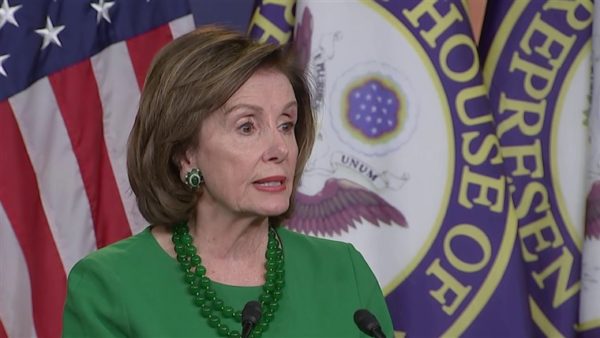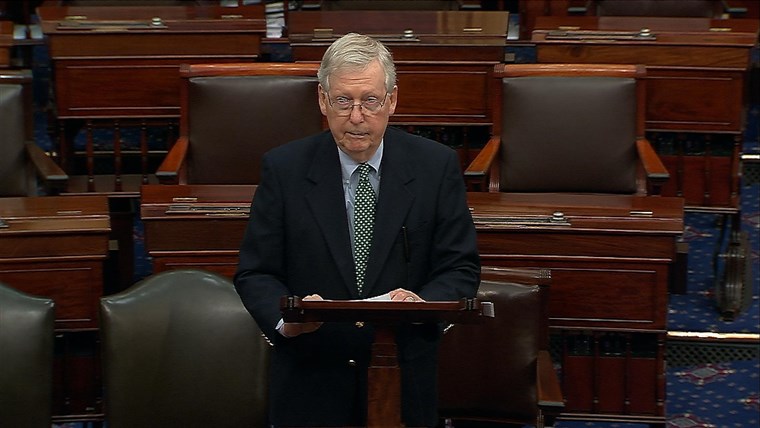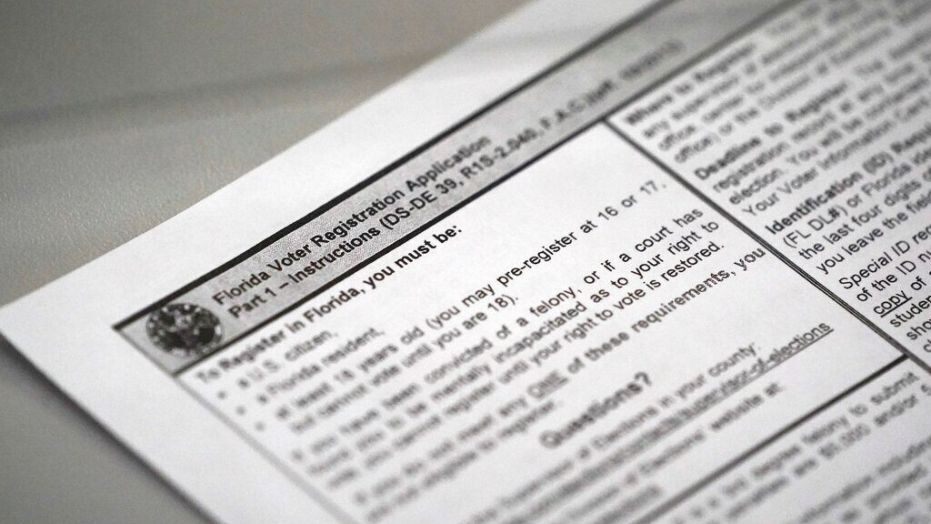WASHINGTON — With President Donald Trump fading further into the background as a leader on coronavirus action, House Democrats and Trump lieutenants are battling to bolster the federal response.
Separately for the most part, but with some collaboration, they are racing to shape legislative and executive policy solutions to a pandemic that has spread rapidly from the public health arena to infect the economic health of the nation. The officials — elected Democrats, Trump-administration Republicans and nonpartisan federal agency chiefs — are also seeking to deliver accurate and consistent information to the public about the importance of slowing down the virus, after weeks of Trump downplaying the risks.
In doing so, they find themselves fighting the fierce partisan instincts of Trump and Senate Majority Leader Mitch McConnell, R-Ky., who vowed to crush a bill that House Speaker Nancy Pelosi, D-Calif., spent much of her morning discussing with Treasury Secretary Steven Mnuchin on the telephone.
It all boils down to a monumental test of Washington’s ability to confront a crisis when the president is unwilling to fully acknowledge its scale, and that could have serious consequences for the political fortunes of Trump and Republicans in Congress — not to mention a vice president who is widely believed to have presidential aspirations of his own.
“The air is rapidly escaping Trump’s re-election balloon,” Dan Eberhart, a Trump supporter and major fundraiser for the Senate GOP, said in a text message to NBC News. “The economic data that is going to show up in a month or so is going to be universally negative.”
There has been some “irresponsible rhetoric,” Vice President Mike Pence told the “TODAY” show’s Savannah Guthrie on Thursday morning after she read him a tweet from Trump accusing Democrats of overhyping the threat of coronavirus.
Though Pence went on to say Trump’s top priority is public safety, the rebuke was an unusually harsh assessment from a vice president who less than two weeks ago was handed the brutal task of coordinating a government-wide response to a crisis his boss once dismissed as a hoax.
Pence will no doubt be judged in part on how he walks the tightrope of trying to show loyalty to Trump while avoiding blame for anything the president does to make the situation worse — all while actually managing the sprawling federal effort to contain the intertwined threats to public health and the economy.
Meanwhile, former Vice President Joe Biden, the front-runner for the Democratic presidential nomination, delivered his own remarks on coronavirus Thursday, setting up a shadow alternative to the Trump approach from the campaign trail.
“When there is so much fear in the country and all across the world — we need American leadership,” he said in a tweet before his afternoon speech. “We need presidential leadership.”
By Wednesday night, Biden had named a task force of advisers he said he would turn to for counsel on the matter.
Trump, who devoted just the second Oval Office address of his presidency Wednesday night to the coronavirus response, has declined so far to declare a national emergency, which would effectively send billions of dollars to states. That appears to be related to his reluctance to stoke fears that could further damage the economy and his re-election chances.
But denying reality has its own pitfalls. If the president starts to lose the trust of his own supporters, he could launch into a political tailspin.
His tardy reaction to the threat allowed the risk of an uncontrolled outbreak to grow over the last two months. All across the country, public officials and businesses are canceling major gatherings, from NBA games to St. Patrick’s Day parades.
And stocks continued to take a beating Thursday morning, with trading halted at the New York Stock Exchange for the second time in a week — the first time that has happened in more than two decades.
On Capitol Hill, lawmakers announced that the Capitol complex would be closed to the public through the end of the month, and senators and House members attended separate bipartisan briefings featuring a panel of administration officials that mixed in health officials with loyal Trump appointees.
That did little to ease the partisan divide at the leadership level, as Democrats complained they weren’t getting good enough information and Republicans accused Democrats of trying to turn the situation into an opportunity to sneak favored policy items into law.
McConnell berated Pelosi from the Senate floor over her draft of a second emergency bill to address the crisis, and he told Americans not to worry at all about the economic repercussions of the coronavirus.
“The good news is that our nation’s economy remains strong,” McConnell said. “The president is continuing to take action himself. We just passed billions in urgent funding last week. And the Senate will continue to stand ready and willing to work toward further bicameral, bipartisan actions when the House Democrats decide to get serious.”
McConnell, who has not prepared a similar comprehensive emergency bill, said his colleagues would try to pass “smaller, noncontroversial pieces of legislation right away that would bolster particular aspects of the fight against coronavirus.”
The House aid package would require agencies and private business to cover the costs of diagnostic testing for the illness — an idea Trump appeared to support in his Wednesday night remarks — and provide various types of financial aid to people affected by what has quickly become a pending economic crisis.
McConnell blasted the proposal as a Democratic “wish list” that would put “unfunded mandates” on businesses and create a “brand-new bureaucracy” within the Social Security Administration, which would be responsible for overseeing an expansion of paid leave benefits for affected workers.
House Minority Leader Kevin McCarthy, R-Calif., said the latter provision would strain the ability of the Social Security Administration to process checks for the elderly — the population most at risk of dying from coronavirus. The agency’s current administrative costs amount to less than one-tenth of 1 percent of its expenses, it completes more than 150 million online transactions per year, and in 2018 it reduced the number of pending actions at processing centers by 3.2 million.
In short, it’s one of the most efficient agencies in the federal government.
Shortly after McConnell spoke, Mnuchin and Pelosi held their third call of the morning.
“Language discussions” regarding the House bill “are continuing,” Pelosi spokesman Drew Hammill wrote on Twitter.



